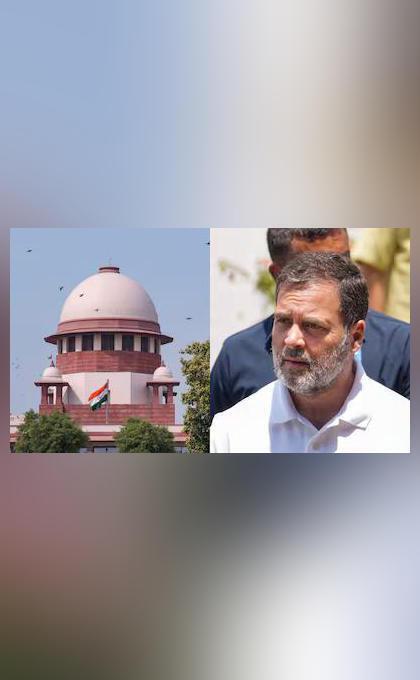
Why ask on social media & not in parliament: SC to Rahul on ‘land grab’ claim
In a recent turn of events, the Supreme Court of India has rebuked Congress leader Rahul Gandhi for his statement claiming that China had grabbed 2,000 square kilometers of Indian land. The court’s remarks were made while staying a defamation case against Rahul Gandhi for his remarks about the Indian Army. The next hearing in the case is scheduled after three weeks.
Rahul Gandhi had made the statement in 2020, sparking a heated debate and controversy. However, the Supreme Court has now raised questions over the credibility of his claim, stating that he should have asked such questions in Parliament instead of sharing them on social media.
The court’s stern rebuke has sparked a significant amount of discussion and debate, with many arguing that Rahul Gandhi’s statement was an attempt to sensationalize the issue and garner attention. Others have defended Rahul Gandhi, stating that he was merely trying to raise awareness about a pressing national issue.
So, what exactly did Rahul Gandhi say, and why did the Supreme Court intervene? Let’s take a closer look.
The Statement
In 2020, Rahul Gandhi made a statement claiming that China had grabbed 2,000 square kilometers of Indian land. The statement was made during a rally in Wayanad, Kerala, where he was campaigning for the Lok Sabha elections.
Gandhi’s statement was met with widespread criticism and outrage, with many accusing him of spreading misinformation and fake news. The Indian Army and the government also refuted his claims, stating that there was no evidence to support them.
The Supreme Court’s Intervention
The defamation case against Rahul Gandhi was filed by 19 Bharatiya Janata Party (BJP) leaders and workers, who claimed that his statement had damaged their reputation and caused them harm.
During the hearing, the Supreme Court asked Rahul Gandhi’s lawyers why he had made the statement on social media instead of asking questions in Parliament.
“How do you know that 2,000 square kilometers of land was occupied?” the court asked. “Why don’t you ask such questions in Parliament instead of making false claims on social media?”
The court’s remarks were seen as a significant blow to Rahul Gandhi’s credibility, with many arguing that he had failed to provide any evidence to support his claim.
The Debate
Rahul Gandhi’s statement has sparked a heated debate, with many arguing that he was merely trying to raise awareness about a pressing national issue. Others have defended him, stating that he was simply trying to hold the government accountable for its handling of the border dispute with China.
However, the Supreme Court’s intervention has raised questions over the credibility of Rahul Gandhi’s claim. Many have argued that he should have provided concrete evidence to support his statement, rather than making unsubstantiated claims on social media.
The Broader Context
The Supreme Court’s rebuke of Rahul Gandhi comes at a time when the country is facing a significant crisis on its borders. The standoff between India and China has been ongoing for several months, with tensions remaining high.
The issue has sparked a significant amount of debate and discussion, with many arguing that the government has failed to take adequate measures to protect the country’s borders.
Rahul Gandhi’s statement was seen as an attempt to capitalize on the issue, but the Supreme Court’s intervention has raised questions over his credibility.
Conclusion
In conclusion, the Supreme Court’s rebuke of Rahul Gandhi over his ‘land grab’ claim has sparked a significant amount of debate and discussion. While some have defended him, arguing that he was merely trying to raise awareness about a pressing national issue, others have questioned his credibility and accused him of making unsubstantiated claims on social media.
The Supreme Court’s intervention raises important questions about the role of social media in politics and the need for credible evidence to support claims. As the country continues to grapple with the border dispute with China, it is essential that we prioritize fact-based reporting and credible sources of information.
Source:






